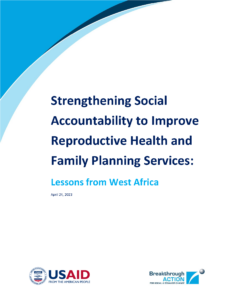Social accountability is an approach that encourages ordinary citizens and/or civil society organizations to hold elected leaders and government entities answerable to their commitments. In the health sector, social accountability approaches seek to improve health service quality, delivery, and outcomes by applying a wide range of approaches, tools, and methods; including information about user rights, entitlements to client exit interviews, and participatory budget exercises.[1]
In West Africa, Breakthrough ACTION implements community initiatives to increase the use of reproductive health and family planning services under two regional buy-ins: West Africa Breakthrough ACTION (WABA) and Resilience in the Sahel Enhanced (RISE II). These community efforts build interest and confidence at the population level while increasing accountability within the health and municipal governance systems to impact service delivery positively.
The Strengthening Social Accountability to Improve Reproductive Health and Family Planning Services: Lessons from West Africa technical brief presents the WABA and RISE II project experiences in addressing social accountability while implementing community engagement efforts in the context of social and behavior change for health.
[1] Malena, C., Forster, R., & Singh, J. (2004). Social accountability: An introduction to the concept and emerging practice. Social Development Paper 76. World Bank.


